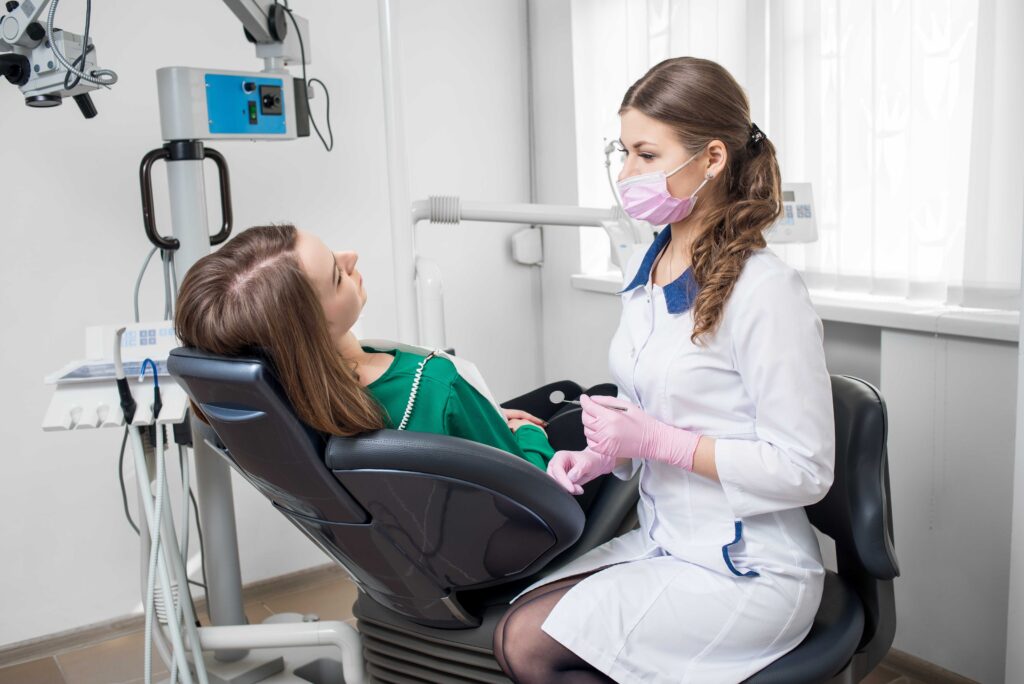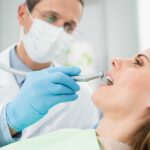Dental emergencies can catch us off guard, but knowing how to respond swiftly can make all the difference in preventing further damage and ensuring your oral health. Rush Creek Dentistry is dedicated to providing you with comprehensive guidance on managing dental emergencies effectively. In this blog post, we will delve into various types of dental emergencies, offer step-by-step instructions for immediate action, discuss dos and don’ts, and provide you with a dental emergency kit checklist. Our goal is to equip you with the knowledge to handle dental emergencies confidently.

Types of Dental Emergencies
Toothache or Dental Pain
Toothaches are often caused by tooth decay, gum infection, or tooth sensitivity. The pain can range from dull and persistent to sharp and excruciating. If you experience sudden or severe pain, it’s important to address it promptly.
Immediate Action
- Gently rinse your mouth with warm water to clean the area.
- Use dental floss to carefully remove any food particles stuck between teeth.
- Take over-the-counter pain relievers as directed on the label to manage discomfort.
Chipped or Broken Teeth
Accidents, falls, or biting on hard objects can result in chipped or broken teeth. These situations can be painful and may lead to exposed nerves, increasing sensitivity.
Immediate Action
- Rinse your mouth gently with warm water to clean the area.
- If there’s bleeding, apply a clean piece of gauze with gentle pressure.
- Use a cold compress on the affected area to minimize swelling.
- Collect any broken tooth fragments; they might be reattachable by a dentist.
Knocked-Out Teeth
A knocked-out tooth can be saved if handled promptly and properly. This is especially true within the first hour after the incident.
Immediate Action
- Hold the tooth by the crown, avoiding touching the root.
- Rinse the tooth gently with water if it’s dirty. Do not scrub or use soap.
- If possible, reinsert the tooth into its socket carefully. Hold it in place by biting on clean gauze or a wet tea bag.
- If reinsertion is not feasible, place the tooth in a container of milk, saliva, or a tooth preservation kit. Seek immediate dental care.
Gum Injuries or Cuts
Accidental injuries or even biting into sharp or hard objects can cause cuts or abrasions to the gums, leading to bleeding and discomfort.
Immediate Action
- Rinse your mouth gently with warm water to cleanse the area.
- Apply gentle pressure with a clean piece of gauze to control bleeding.
- If bleeding persists or the cut is deep, seek professional care.
Dos and Don'ts During Dental Emergencies:
Dos
- Rinse with Warm Water: Gently rinsing your mouth helps clean the area and soothe discomfort.
- Preserve Knocked-Out Teeth: Quick action increases the chances of saving a knocked-out tooth.
- Use a Cold Compress: Applying a cold compress can reduce swelling and alleviate pain.
- Keep the Area Clean: Maintaining oral hygiene is crucial during emergencies to prevent infection.
Don'ts
- Using Sharp Objects: Avoid using sharp objects like pins or tweezers to remove lodged food or debris, as this can cause additional damage.
- Ignoring Bleeding Gums: Bleeding gums could be a sign of an underlying issue. Address it promptly to prevent complications.
- Self-Medicating: While over-the-counter pain relievers can help manage pain temporarily, avoid self-medicating without professional guidance.
Immediate First Aid Techniques
Lodged Food Particles
If you feel discomfort due to lodged food particles, gently use dental floss to remove them. Be cautious not to damage your gums or teeth.
Knocked-Out Tooth
If a tooth is knocked out, it’s crucial to act quickly. Try to reposition the tooth into its socket while seeking dental care.
Swelling
Applying a cold compress for about 15 minutes can help reduce swelling and alleviate discomfort. Ensure you wrap the cold compress in a cloth to avoid direct contact with the skin.
Contacting Rush Creek Dentistry
In the event of a dental emergency, your quick response is essential. Rush Creek Dentistry is committed to providing you with immediate assistance. Contact our emergency hotline at [Emergency Hotline Number] to connect with our experienced dental professionals who can guide you through the situation and schedule an appointment as needed.
Creating a Dental Emergency Kit
Having a well-prepared dental emergency kit can make a significant difference in managing unexpected situations. Here’s what you should include:
- Gauze: Useful for applying gentle pressure to control bleeding.
- Dental Floss: Helps dislodge trapped food particles and maintain oral hygiene.
- Cold Compress: Reduces swelling and provides relief from pain.
- Small Container with Lid: If a tooth is knocked out, use this container to store the tooth while seeking dental care.
Ensure your dental emergency kit is easily accessible at home and during travel. Being prepared can save time and minimize discomfort in case of an emergency.
Preventing Dental Emergencies
While emergencies can happen unexpectedly, taking preventive measures can reduce the risk. Here’s how you can safeguard your oral health:
- Mouthguards: If you participate in sports or activities with potential impact, wear a mouthguard to protect your teeth from injury.
- Avoid Chewing on Hard Objects: Refrain from biting on hard objects like ice, popcorn kernels, or pens, which can chip or break your teeth.
- Regular Dental Check-ups: Schedule regular dental appointments to identify and address potential issues before they become emergencies.
- Good Oral Hygiene: Maintain consistent oral hygiene practices, including brushing, flossing, and rinsing, to prevent decay and gum problems.
Importance of Professional Follow-upx
While immediate actions are crucial during a dental emergency, seeking professional follow-up is equally important. Even if you’ve managed the situation effectively, a dental examination is essential to ensure no underlying issues are present. Rush Creek Dentistry’s skilled professionals will thoroughly assess your condition, provide appropriate treatment, and guide you on the next steps for optimal oral health.
Table of Contents
Recent post

Dental Makeovers: Transforming Your Smile with Cosmetic Dentistry


Restoring Dental Function: Restorative Treatments for Long-Lasting Smiles
Dental Implant FAQs
What should I do if I experience a sudden toothache?
Rinse your mouth gently with warm water, use dental floss to remove any debris, and consider taking over-the-counter pain relievers. Contact Rush Creek Dentistry for further guidance.
How can I preserve a knocked-out tooth?
Hold the tooth by the crown (avoid touching the root), rinse it gently, and try to reposition it in its socket. If not possible, store the tooth in milk, saliva, or a tooth preservation kit and seek dental care immediately.
Can I use sharp objects to remove food stuck between my teeth?
No, using sharp objects can damage your gums and teeth. Use dental floss gently to remove lodged particles.
How do I prevent dental emergencies during physical activities?
Wear a mouthguard to protect your teeth while participating in sports or activities that carry a risk of impact.
What if a chipped tooth doesn't hurt? Do I still need to seek professional help?
Yes, even if a chipped tooth doesn’t hurt, it’s important to have it evaluated by a dentist. Undetected issues can lead to complications later on.
Conclusion
By being well-informed and prepared, you can confidently handle dental emergencies and take appropriate actions to safeguard your oral health. Rush Creek Dentistry is here to support you during these critical moments. Remember, quick and knowledgeable responses can make a significant impact in preventing further discomfort and ensuring optimal oral well-being.
